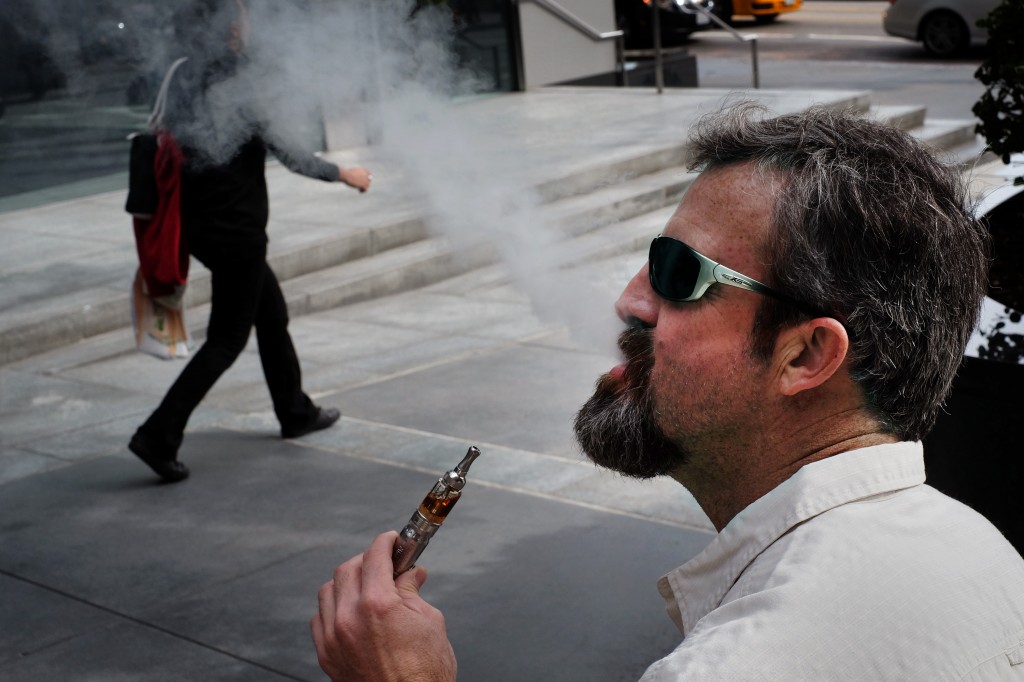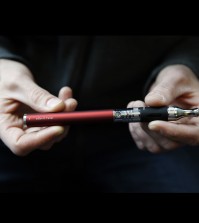- California Assembly OKs highest minimum wage in nation
- S. Korea unveils first graphic cigarette warnings
- US joins with South Korea, Japan in bid to deter North Korea
- LPGA golfer Chun In-gee finally back in action
- S. Korea won’t be top seed in final World Cup qualification round
- US men’s soccer misses 2nd straight Olympics
- US back on track in qualifying with 4-0 win over Guatemala
- High-intensity workout injuries spawn cottage industry
- CDC expands range of Zika mosquitoes into parts of Northeast
- Who knew? ‘The Walking Dead’ is helping families connect
California declares electronic cigarettes a health threat

Paul Frohman smokes an electronic cigarette outside an office building in downtown Los Angeles on Wednesday, Jan. 28, 2015. California health officials declared electronic cigarettes a health threat that should be strictly regulated like tobacco products, joining other states and health advocates across the U.S. in seeking tighter controls as “vaping” grows in popularity. (AP Photo/Richard Vogel)
SACRAMENTO, Calif. (AP) — California health officials on Wednesday declared electronic cigarettes a health threat that should be strictly regulated like tobacco products, joining other states and health advocates across the U.S. in seeking tighter controls as “vaping” grows in popularity.
The California Department of Public Health report says e-cigarettes emit cancer-causing chemicals and get users hooked on nicotine but acknowledges that more research needs to be done to determine the immediate and long-term health effects.
New generations of young people will become nicotine addicts if the products remain largely unregulated, California Health Officer Ron Chapman said. Last year, 17 percent of high school seniors reported using e-cigarettes, known as vaping, according to the report.
“Without action, it is likely that California’s more than two decades of progress to prevent and reduce traditional tobacco use will erode as e-cigarettes re-normalize smoking behavior,” the report says.
E-cigarettes heat liquid nicotine from cartridges into inhalable vapor without the tar and other chemicals found in traditional cigarettes. People who use e-cigarettes can adjust their nicotine levels and use the same cartridge for an extended period of time.
California banned the sale of e-cigarettes to minors in 2010, but the report raises concerns about the products appeal to children with flavors such as cotton candy and gummy bear. Reports of children under 5 with e-cigarette poisoning jumped from seven in 2012 to 154 last year.
The California report says e-cigarettes emit as many as 10 toxic chemicals, but advocates say there is no evidence those substances are released at dangerous levels.
“Despite the health officer’s false claims, there is ample evidence that vaping helps smokers quit and is far less hazardous than smoking,” Gregory Conley, president of the e-cigarette advocacy group American Vaping Association, said in an email. “Smokers deserve truthful and accurate information about the relative risks of different nicotine products, not hype and conjecture based on cherry-picked reports.”
Health officials called for restrictions on the marketing and sale of e-cigarettes, protections against accidental ingestion of liquid nicotine and an education campaign on the dangers of using e-cigarettes.
A state senator introduced legislation this week that would regulate e-cigarettes as tobacco products and ban their use in public places such as hospitals, bars and schools. A similar bill was defeated last year over opposition from tobacco companies.
E-cigarettes have become more visible as they grow in popularity and commercials for the products air in places where traditional cigarette ads have been banned. Businesses related to e-cigarettes, including vaping lounges, are rapidly popping up in cities across California.
Geoff Braithwaite, co-owner of an Oakland store that sells liquid nicotine for e-cigarettes, said he understands the need to restrict vaping in public and prevent sales to minors. He says his customers are longtime smokers who should be able to get a nicotine buzz without the harshness of a regular cigarette.
“Nicotine has all this stigma attached solely to the medium we used to use,” Braithwaite said. “When you try to outright ban e-cigarettes, you’re lumping in the solution with the problem.”
Other states, including Oklahoma, Tennessee and Arkansas, already have issued advisories cautioning the use of e-cigarettes.












![일본 사도광산 [서경덕 교수 제공. 재판매 및 DB 금지]](http://www.koreatimesus.com/wp-content/uploads/2024/07/PYH2024072610800050400_P4-copy-120x134.jpg)


